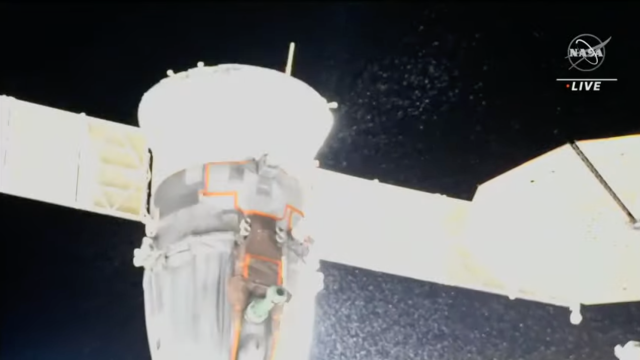A Russian spacewalk was called off on Wednesday after a Soyuz spacecraft attached to the International Space Station (ISS) started leaking coolant in low Earth orbit. For one NASA astronaut and two Russian cosmonauts on board, that could mean their ride back to Earth is suddenly gone.
The crew on board the ISS were not harmed, but the Soyuz spacecraft’s “external casing” on the service module appears to have sustained damage, resulting in the leak, Russian state-run media TASS reported based on a statement from Russia’s space agency Roscosmos. A “visual inspection confirmed the leaking,” forcing Roscosmos to postpone the spacewalk, according to the statement. The cause of the damage to the Soyuz service module remains unknown.
On Wednesday, Cosmonauts Sergey Prokopyev and Dmitri Petelin had donned their spacesuits and prepared to exit the space station for a spacewalk that was scheduled to begin at 9:20 p.m. ET. However, about two hours before, ground teams noticed “significant leaking of an unknown substance” from the Soyuz MS-22 spacecraft, NASA wrote in a blogpost. NASA’s livestream of the spacewalk showed an upsetting fountain of particles bursting out from the spacecraft and into space, with the stream remaining visible for more than three hours.
The ISS crew later reported a Soyuz sensor reading that indicated a drop in pressure of the spacecraft’s cooling system. Russian cosmonaut Anna Kikina used a robotic arm outside the space station to get a closer look at the coolant leak and sent photos of the spacecraft to ground teams for further assessment.
The ISS crew were never in any danger, but it’s not yet clear if the stricken spacecraft will now be able to carry its associated astronauts back home. NASA astronaut Frank Rubio and Roscosmos cosmonauts Sergey Prokopyev and Dmitri Petelin launched on board the Soyuz spacecraft in September and are due to return to Earth in the spring of next year.
The Soyuz MS-22 might still work as a return vehicle, but should Roscosmos and NASA deem it to be unusable, Rubio, Prokopyev, and Petelin would essentially be stranded aboard the ISS until a replacement vehicle is flown to the orbiting lab. Easier said than done, as SpaceNews reports:
Roscosmos could launch the next Soyuz to the station without any crew on board as a replacement, but it’s uncertain when the spacecraft, Soyuz MS-23, could be prepared for launch, and doing so would affect future crew rotations. Soyuz MS-23 is currently scheduled to launch to the station in March 2023 with two Roscosmos cosmonauts and one NASA astronaut.
Rubio was the first NASA astronaut to fly aboard a Russian Soyuz rocket since April 2021, the result of a recent seat-swap agreement. The arrangement stipulated that a U.S. astronaut would ride aboard a Soyuz capsule in exchange for a Russian cosmonaut strapping into a Crew Dragon for the very first time.
NASA and Roscosmos are working together to determine the next course of action following their analysis, NASA wrote in the blog post. The pair have had some tension lately, a result of Roscosmos retaliating against Western sanctions imposed against Russia due to the invasion of Ukraine. The seat-swap agreement was a rare glimpse of cooperation, but now that seat appears to have been compromised.
More: Russian Cosmonaut Forced to Abandon Spacewalk Due to Spacesuit Power Malfunction
